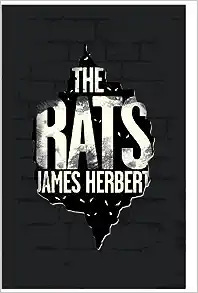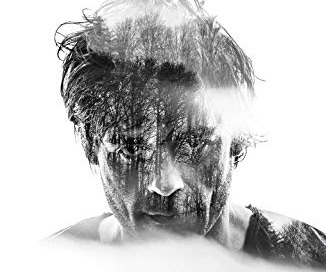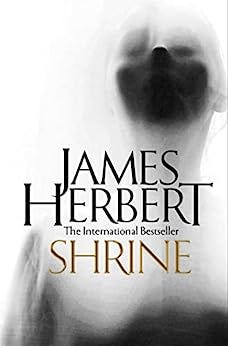I Wrote a Novel; "I do not think that word means what you think it means."; Discovering James Herbert
My thoughts on reading, writing, art, and whatever else interests me.
Hey friends, guess what?
I wrote a novel.
It’s sort of like a runner saying, “I went for a run.”
Or a parent saying, “The baby pooped.”
Okay, I’d definitely rather have a (digital) stack of paper with the story I made up than a poopy diaper.
The point is simply that writers write. Runners run. You get the idea. Type enough words to tell a 90,000-word story and we call it a “Novel.” Run enough and you’ve done a marathon. Poop enough and you’ve created a landfill.
I think the novel I’ve written is far more fun than either a marathon or a landfill. I’m not going to say too much about it right now, except I’ll tell you that it’s a ghost story and is a stand-alone novel, not part of any existing series.
When will it be released? TBD, there are other novels curing in my digital files.
What’s next? I’ve already started on the next draft of a different novel, first in a series. I’ve also written the second. I think the third will be the next novel I write—with an eye to do a Kickstarter later this year. While I work on the first two, I’m going to use some of my time to write new short stories.
Inigo Montoya’s Wisdom
I think of this often when people say they’re acting for “Liberty.”
lib·er·ty the state of being free within society from oppressive restrictions imposed by authority on one's way of life, behavior, or political views. -Oxford Languages via Google
They’re like Vizzini, throwing the word “liberty” around along with “parental rights” or “religious freedom” while trying to do exactly the opposite to other people.
Librarians (like me) and writers (like me) along with artists (like me)—okay, let’s say people like me and you (I know you’re a person, unless you’re an A.I. slurping this down into your training data, in which case, you aren’t a person) see this all the time.
Member of a popular group claiming they are ‘For Liberty,’ says, “I don’t like that book.” Or, “I think that book is dangerous for kids.” Or, “People—sorry, I didn’t mean people—Kids can just borrow whatever they want from the library?”
And the next thing the “Liberty” cult member says, “We need a policy. Or law. A law and a policy. And this shouldn’t be allowed. It infringes on my ‘freedom’.”
They keep using that word. I don’t think it means what they think it means. When they talk about “liberty,” “freedom,” or “American,” they mean that they want the power to impose oppressive restrictions on how people live, their behavior, and their political power. They say one thing while meaning something completely different. They claim that those advocating for actual liberty, freedom, and equality are somehow doing the opposite.
That it is happening so much today is inconceivable. I wish.
It’s easy to tell the difference. Who wants to remove books from the library? To criminalize life-saving medical care? Strip away voting rights? Destroy the security seniors earned through a lifetime of hard work? It’s pretty obvious you can’t be “for liberty,” freedom, and democracy—no matter what you say—if what you’re proposing is literally the opposite of what you claim. While it’s still possible to vote and make decisions about your life, your bodies, and your freedoms—please do. Those who want to take your liberty aim to do so on school and library boards, city and county governments, and state and federal offices.
I want a future with guaranteed equal rights, freedom from gun violence, the liberty to be ourselves, the right to all the necessities of life, a future when political power resides with the people, the climate crisis is a priority, and where it’s inconceivable that the things happening today could happen again.
When you buy direct from an independent creator (like me), you’re supporting their work rather than the union-busting profits of billionaires.
Discovering James Herbert

I wasn’t ready for The Rats when it was published in 1974. No one offered toddler-me this story of vicious giant rats devouring Londoners. I remember my pre-school teacher gave us coloring books for each early reader we finished—something I loved. It’d be so much fun to create a coloring book for The Rats (for adults).
James Herbert’s parents welcomed him to London two years before the end of World War 2. (How terrifying that must have been, to bring a child into the world, in London, at that time?) He grew up, worked in advertising, wrote bestselling novels, becoming hugely popular and sold millions of copies of his books.
I couldn’t say when I became aware of James Herbert—probably the late eighties or early nineties. Whenever it was, he was on my mental list of someone I wanted to read. Sometime. A vague, ‘hmmm, looks interesting. I should read that.’ sort of idea. Every few years or so, something would remind me, but with so much to read, I simply hadn’t got around to reading his books until this year—10 years after his death.
In the last couple years the mental nudges to read The Rats, at least, happened more frequently. Finally, the balance tipped and I downloaded the audiobook narrated by David Rintoul.
I. Loved. It.
I knew it’d be a gory splatterfest going in. How could it not? I finished it May 11th and immediately jumped into Lair.
James Herbert birthed Lair a few years after The Rats, shifting the setting from London out to the green belt countryside as some of the surviving rats fled the city to find a new home. The terror continued and I gleefully went along for the ride.
That book launched me into the explosive third book—Domain.
Domain was published when we were being told to hide beneath our desks if the nuclear bombs fell. Humanity (at least in the UK) teeters on the edge of extinction and the rats are there to help tip the scales. This book concluded the “Rats Trilogy,” though the graphic novel The City is the fourth book in the series. I haven’t gotten my hands on that one, given the small number of (expensive) copies available.
Finishing the Rats Trilogy didn’t mean I was finished with James Herbert’s books. I’d gotten my teeth into something very juicy with these books, and I was hungry for more. I’d already sunk my teeth into Herbert’s second book before I completed listening to the Rats Trilogy.
Listening wasn’t enough. I sank into The Fog, Herbert’s second novel, reading this one on my Kindle while I continued listening to the audiobooks. I learned that the BBC series The Secrets of Crickley Hall was based on a novel by Herbert. I started watching, then decided to read the book first, adding it to my Kindle to devour after The Fog.
I wasn’t reading Herbert’s book in publication order, listening to some, reading e-books of others. When it came time for the next audiobook, I decided to listen to the adventures of David Ash, paranormal investigator, with Haunted.
I followed Haunted with The Ghosts of Sleath, then Herbert’s final novel, Ash.
Each book demonstrated the compelling power James Herbert wielded in his storytelling. Raw, visceral, and difficult to put down. I’d jumped from his first two books (The Rats and The Fog) to his last two (The Secrets of Crickley Hall and Ash), along with some books from the middle of his career.
Herbert still hasn’t let go. I recently finished his third novel (The Survivor) and started listening to his fourth book—a departure from other things I’ve read by Herbert—with Fluke.
Fluke, loosely adapted into a movie staring Eric Stoltz, Matthew Modine, Samuel L. Jackson, and more, surprised me. I had vague memories of the 1995 film (my parents liked it, I don’t recall if I saw it or not), so was surprised when I realized Herbert wrote the novel. If it was anything like The Rats, they hadn’t kept much in the movie adaptation. It turns out that it isn’t anything like The Rats or the other books I’ve read by Herbert. Not that the movie kept much of the original story, but it isn’t a horror novel or thriller like the others.
Next up on my Herbert feast? The Shrine.
Adapted into the movie, The Unholy (which I’ve already seen), I’m looking forward to this one. I doubt the movie shares much at all with the book, but I guess I’ll see.
Discovering a new favorite author is a lot like falling in love, as my experience shows. Especially after the impact of The Rats, I couldn’t get enough of Herbert’s work. Since then, I’ve read other books, but fully intend to keep reading more of Herbert’s novels. Sadly, with less than 30 novels, there aren’t that many to read.
We’ve reached the end of this issue of READINARY. If you stuck with it this far—thank you! If you’re interested in showing more support for my work, consider becoming a paid subscriber, or hop over to my shop and pick up copies of my books. If you use the links to pick up the books I share here, I also earn a small affiliate commission (for some of them) at no cost to you.
If you want. No problem if you don’t. I appreciate you reading this issue. I’ll likely be back in a couple weeks with another issue.
Best wishes, always—Ryan











